Have you ever wanted to raise your own quality meat but don’t think you can in a small space? Please know that it can be difficult, but it’s not impossible.
We live on 1/5 acre, smack dab in the middle of a little town, and are able to raise our own chickens, turkeys, ducks, and rabbits. I would love to share with you how we raise meat for our family.
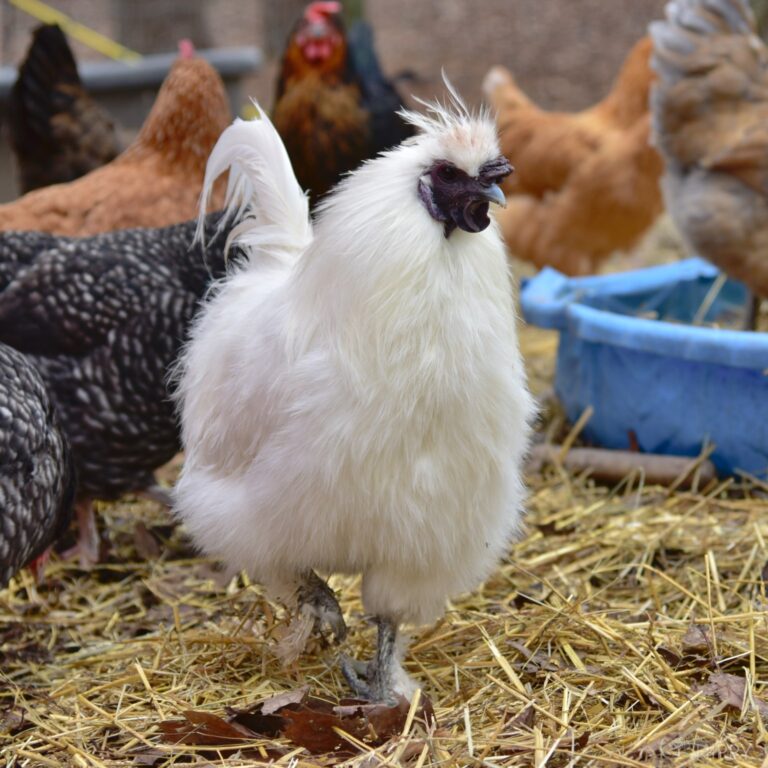
Please know that even though our situation may be different, as we do not have any zoning laws against farm animals in our town and our neighbors are quite supportive in what we are doing, that you can still raise quality meat.
The first thing we had to do was decide that a manicured lawn just wasn’t as important as knowing where our food comes from. If you were to look at our yard in the early Spring, you would see nothing but barrenness.
So, even if you aren’t a “full fledged” homesteader, there are things you can do to feed your family. Here are some great ideas that anyone can do, even in just a little bit of space.
Chickens
Raising meat chickens isn’t difficult, truly.
There are just a few things they need, like quality feed, clean water and room to move about a bit.
Believe it or not, we are able to raise up to 150 meat birds on our little homestead, and since they only take about 6-8 weeks from chick to freezer, they are a short-term commitment.
Although you can really raise any kind of chicken in smaller spaces, there are a few breeds that are better than others.
Easter Eggers, Barred Rocks, Welsummers, and Orpingtons are all good options. Of course, you can’t go wrong with bantam species or those that are naturally on the small side (like Silkies) either.
Read more here:
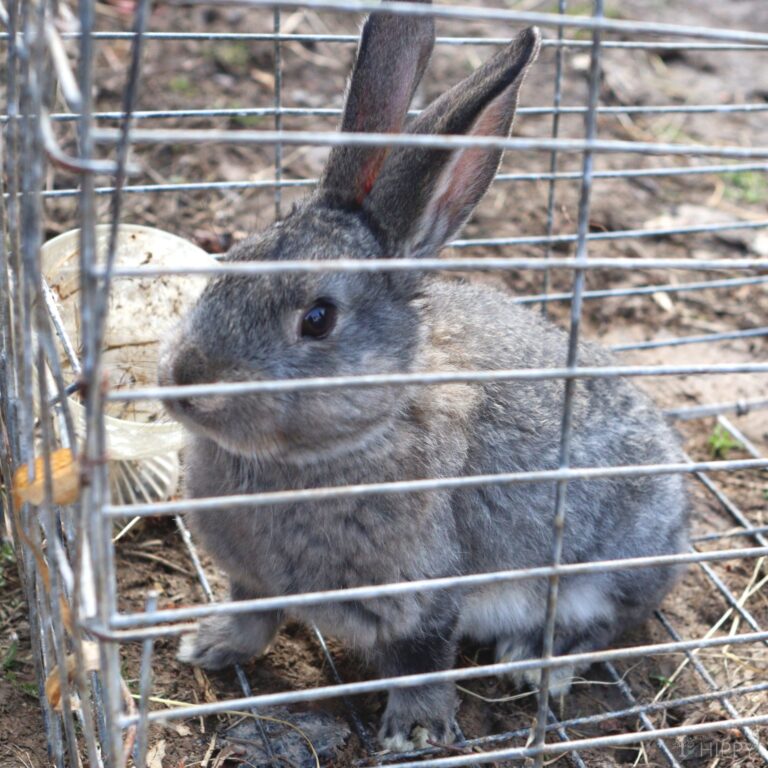
Rabbits
Even though we personally do not eat rabbits (due to religious reasons), many have found rabbits to be an easy source of quality protein. They are quiet, easy to care for, and so cute as well!
Some of the best breeds of rabbits to consider raising if you live in close quarters include the Netherland Dwarf, English Angora, Lionhead, or Jersey Wooly. These breeds are born small – and stay pretty small, too.
Here are some great tips on raising rabbits for your homestead:
- Pros and Cons
- Raising Rabbits in the Winter
- Breeding Meat Rabbits
- Getting Started With Homestead Rabbits
Quail
Quail is another great way to get quality meat in a small space because the eggs are considered a delicacy and bring in more money than chicken eggs.
The best part is they are also Kosher, so they are a great choice for everyone.
- My friend Jess has some great info about raising quail in detail here.
- Intro to Quail
- Why You Should Consider Quail Farming
Pygmy Goats
Pygmy goats are just about as adorable as they get – which is why they’re found on practically every hobby farm with limited space.
In addition to being raised as pets, these animals can also be raised for meat or dairy. They are great alternatives to larger goat breeds that require more space, and take up about half the area.
These animals can produce up to two quarts of milk per day. Pygmy goats rarely get more than two feet tall and weigh just 60 to 70 lbs (probably about the size of your dog).
They are energetic and animated, making them a delight to be around.
Berkshire Pigs
You probably won’t find yourself raising pigs if you live in downtown Manhattan, but if you only have a couple of acres and think you don’t have enough space to raise hogs, think again. You just have to find the right breed.
One of the best breeds for limited space is the Berkshire. The Berkshire’s roots can be traced back to England in the 1800s. This breed is prized for its meat producing juicy pork that marbles well. It’s considered a luxury menu item in Japan!
Berkshires thrive on small farms. They are incredibly hardy and forage well.
They have a dark coloring that protects them against sunburn and thick hair that protects against the cold – so you don’t need a full-fledged barn to protect them from the elements like you might with other pig breeds.
Babydoll Southdown Sheep
This absolutely adorable sheep is one of the best sheep breeds to raise on a small farm.
Again, you probably won’t be raising a flock of sheep if you live in the middle of the city but if you live outside of town and just don’t have a lot of acreage, you might want to consider this sheep breed.
The ewes sit at just under two feet tall, with the rams coming in not much taller.
They produce a fuzzy white or black fleece that can be spun into fiber. They’re also great foragers who can help keep the grass trimmed. Many people raise Southdowns for meat or as pets, too.
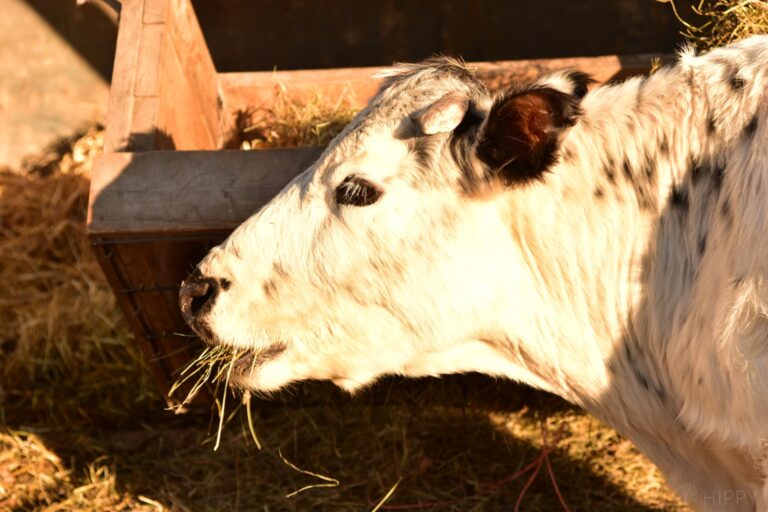
Miniature Cattle
Want to raise cows but don’t have a ton of space? It’s miniature cattle to the rescue!
A large herd of Holsteins isn’t right for everyone, but there are lots of miniature cattle breeds, like Lowlines, Miniature Herefords, Miniature White Park, and Miniature Jerseys, that can be raised on small farms.
If miniature cattle aren’t for you – and you’d like to give the full-sized ones a try – you might want to consider raising Dexter cattle.
These are some of the smallest cattle breeds you can raise. Bulls measure less than four feet tall at the shoulder and weigh less than 1000 pounds.
They’re small and squat, with an excellent feed conversion rate and the ability to produce delicious milk.
Per animal, they require just half an acre of grass or 12-15 pounds of hay (plus some grain) each day. That’s not bad, especially when compared to other larger cattle breeds.
Plus, these animals grow to butcher-weight in just under two years, meaning it won’t take long to get a good return on your investment.
Jacob Sheep
Jacob sheep are often raised for their fleece, which has unique color combinations of white and black, but you can also raise them for meat.
Ewes will weigh up to 120 pounds while rams are never more than 180. These beautiful animals look primitive, and although they’re great for small farms, they can be somewhat hard to find. They’re often crossed with other breeds, like Dorsets.
Tamworth Pig
Originally from England, these rugged hogs are great at foraging and don’t need much space – although you should give them as much space as possible to wallow and root.
They have a dark red coloring that makes it easy for them to adapt to a variety of conditions.
Not only that, but this is one of the best pigs you can raise if you want a lot of bacon. They can be raised for all other cuts of meat, too, and the sows are known for their mothering abilities.
Miniature Cheviot Sheep
The Cheviot sheep is another sheep breed raised on your farm. Again, this is another one that is often raised for fleece, but you can raise it for meat as well.
There is a “miniature” version that’s perfect for small farms, with mature ewes weighing as little as 45 pounds.
These active sheep are mild-mannered and great at foraging – two other reasons you should consider adding them to the farm.
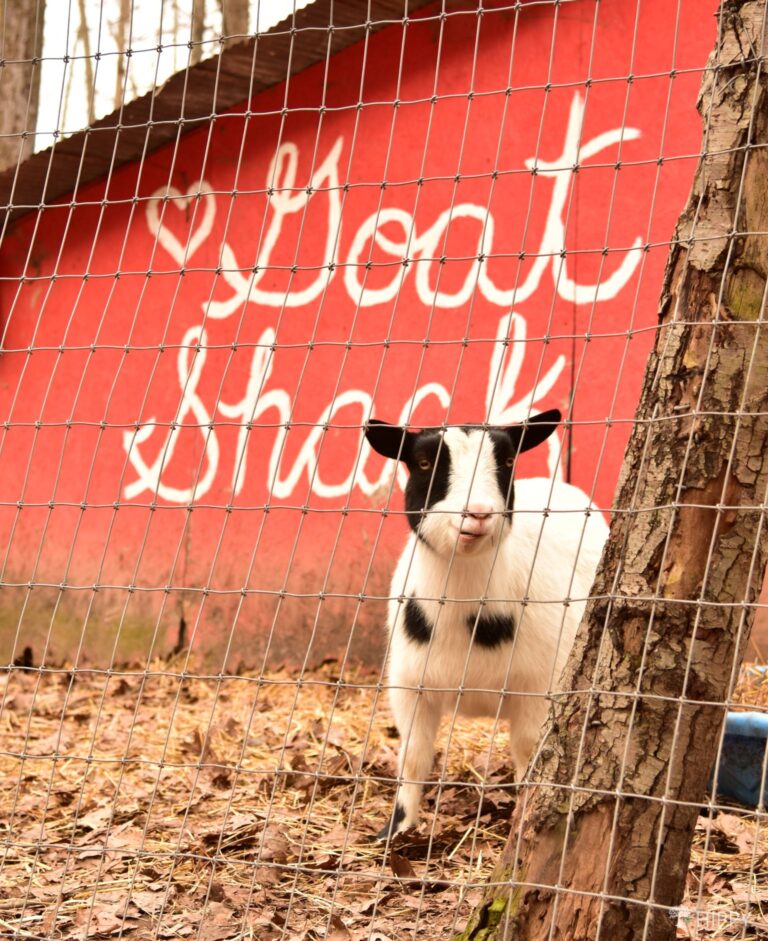
Nigerian Dwarf Goat
Most people don’t eat Nigerian dwarf goat meat, instead raising these animals for milk or as 4H pets.
However, it’s important to note that pygmy goats – including Nigerian Dwarfs – were originally raised as meat animals and only kept as pets because their small size made meat production less efficient.
These animals reach less than two feet in height and are also great for milk. They produce a shockingly high volume of milk for their size and this milk is much higher in butterfat than other breeds.
Turkeys
Turkeys need more space than chickens, but the good news is that they do quite well on pasture – meaning you don’t need to invest as much in feeding them.
There are a few turkey breeds that you might want to consider raising if space is tight.
These Include Bourbon Reds and Narragansetts. The Narragansett is a cross between wild and domestic turkeys. Both breeds produce a fair amount of eggs, too.
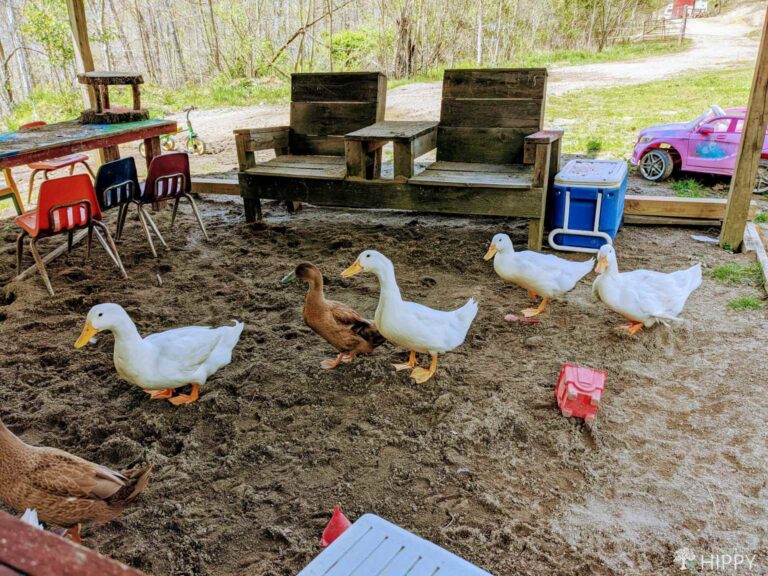
Ducks
Next up is ducks. Ducks are some of the easiest animals to raise in limited space. Unlike chickens, they don’t even need a place to roost!
Provide them with a little shed to sleep in and a bit of water to splash around in (even a kiddie pool will do) and you’re good to go.
Duck eggs can sell upward of $1 a piece right now, or even as much as $18 a dozen in some areas! A duck won’t lay as many eggs as a chicken, but this is still an animal worth considering if you don’t have a lot of space.
Some good duck breeds for farmers with limited acreage include Rouens, Indian Runners, Khaki Campbells, and Blue Swedish ducks. In addition to the eggs, of course, you can also raise these breeds for their tender meat.
Geese
Last but not least, geese. Geese that are in the heavy or medium weight classes are good utility birds. For meat production, consider breeds like Chinese, Embden, Toulouse, Pilgrim, and African.
In addition to the meat, geese can also be raised for their eggs and their fluffy down.
What is the Most Low-Maintenance Farm Animal?
If you want to have animals – and still have a life – then you might want to consider choosing a low-maintenance farm animal. There are lots of options to choose from.
Some people say ducks are the most low-maintenance since they are inexpensive to raise and also don’t require a lot of space. Other good options include:
- Chickens
- Geese
- Sheep or cattle (if you have the space)
You could even raise bees if you don’t have a ton of room (though of course, you won’t be getting any meat out of them!).
What is the Best Animal to Raise on a Small Farm?
Quality protein is available for just about anyone, anywhere if you are willing to think outside the box!
If you’re looking for ways to raise quality meat in a small space, consider these tips.
With the right planning and execution, you can make the most of your limited square footage and produce healthy, delicious meat for your family and friends.
What are some things you would do differently based on what you’ve learned? Let us know in the comments below!
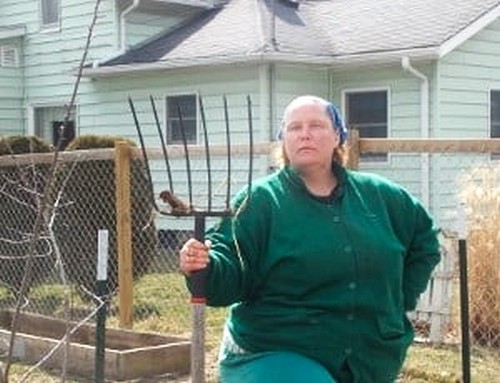
Heather’s homesteading journey started in 2006, with baby steps: first, she got a few raised beds, some chickens, and rabbits. Over the years, she amassed a wealth of homesteading knowledge, knowledge that you can find in the articles of this blog.
Learn more about Heather and the rest of the writers on this page.
